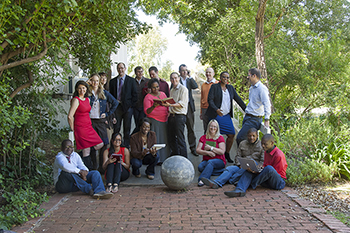Latest News Archive
Please select Category, Year, and then Month to display items
![]()
After South Africa’s battle with the record-breaking drought of 2015, Prof Andries Jordaan from our Disaster Management Training and Education Centre for Africa(DiMTEC) saw room for improvement in dealing with this kind of disaster.
Drought impact
Commercial farmers who are usually net exporters of food crops and communal farmers who own the bulk of the country’s livestock, were all hit hard in 2015. Most of the latter had no resources to spare as the drought progressed. The concern about the drought’s impact on the country’s food production and availability resulted in a joint goal of preventing food scarcity during future droughts.
Prof Jordaan’s visit to the National Drought Mitigation Center (NDMC) in Lincoln, Nebraska, in the US, several years ago prepared him to better equip communities in South Africa to deal with drought situations. “I recognised that in spite of the impact DiMTEC has been able to make on disaster preparedness, a gap remained in disaster response in South Africa.”
Sharing knowledge
In August this year Prof Jordaan again visited the NDMC. This time he requested a few key players in South Africa’s agriculture and disaster response communities to join him. With him were Janse Rabie, head of Natural Resources at AgriSA, a nonprofit organisation that functions as an interface between the government and about 28 000 South Africa farmers, and Moses Musiwale Khangale, director of Fire Services for the South African Ministry of Cooperative Governance and Traditional Affairs.
The South African delegation met with and learnt from climatologists, geospatial technologists, and outreach and planning analysts.
Prestige Scholars Programme invests in promising academics
2015-06-24

Photo: Sonia Small |
Whilst many academics find it challenging to have sustainable funding for specific projects, it is often just as challenging to find relevant exposure and good mentorship programmes to fully prepare academics toward becoming full professors.
Prof Jonathan Jansen, Vice-Chancellor and Rector of the UFS, designed the Vice-Chancellor’s Prestige Scholars Programme (PSP) specifically targeting newly-completed post-doctoral students who are already members of the academic staff.
The goal is to select the most promising young scholars and to make substantial institutional investment in their development.
To date, the PSP has produced 2 Fulbright scholars; 10 National Research Foundation (NRF) rated scholars; 1 NRF Blue Skies research project and 14 NRF Thuthuka-funded projects. These scholars work with the best academics at leading universities on three continents.
Prof Jackie du Toit, co-director of the programme, explains that while the PSP does not provide funding, it is a great programme to empower scholars by means of assistance towards generating funding from outside sources.
Prof Du Toit co-directs this programme with Proff Corli Witthuhn, Vice-Rector: Research and Niel Roos from the Department of Africa Studies.
“The PSP bases its approach to funding on the philosophy that young scholars are to be encouraged towards financial independence, based on a viable postdoctoral project that would sustain their scholarship for five to eight years post PhD. We believe that the cachet and long-term sustainability of existing funding programmes such as Fulbright outweighs the short-term benefits of automatic funding from the PSP. We also endeavour to teach young scholars to work cleverly within institutional parameters, rather than leave them floundering once they step off the active PSP.”